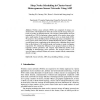163 search results - page 21 / 33 » How Optimal are Wireless Scheduling Protocols |
CISS
2008
IEEE
13 years 10 months ago
2008
IEEE
Cognitive radios permit dynamic control of physical layer resources such as transmission power and constellation size; these degrees of freedom can be employed to achieve significa...
MASCOTS
2010
13 years 10 months ago
2010
The simulation models of wireless networks rapidly increase in complexity to accurately model wireless channel characteristics and the properties of advanced transmission technolog...
ICESS
2007
Springer
14 years 2 months ago
2007
Springer
Abstract. Wireless sensor networks (WSNs) are comprised of energy constrained nodes. This limitation has led to the crucial need for energy-aware protocols to produce an efficient ...
IPSN
2010
Springer
13 years 10 months ago
2010
Springer
The IEEE 802.15.4 standard for wireless sensor networks can support energy efficient, reliable, and timely packet transmission by tuning the medium access control parameters macMi...
INFOCOM
2008
IEEE
14 years 2 months ago
2008
IEEE
—Sleep-wake scheduling is an effective mechanism to prolong the lifetime of energy-constrained wireless sensor networks. However, it incurs an additional delay for packet deliver...

